Importation and exportation of goods in countries is not a new thing. Every country has its natural resource that differs from some other countries, some are rich in metals and minerals, some have an abundant supply of particular resources or product than some other countries, and some are rich in infrastructures and technologies that turn these resources into the finished product and in some cases it could be that some lack that particular good and outsourcing from other neighboring countries is the only way to make these products available to the general public and because of these differences in natural resources and infrastructure importing and exporting is quite inevitable in most countries and for this reason, the government needs to regulate the number of goods and services that go in and out of the country hence the need for tariff.

What Is A Tariff?
A tariff also called customs duty, is a tax levied on goods that are brought into another country by the government of that country receiving the goods. A tariff is a trading instrument used by the government to regulate trade, protect goods produced in the country and as well generate revenue. Tariffs are paid by the business or person importing such goods and in the long run, the customers tend to pay for them, because the amount is eventually added to the cost of the goods.
Facts About Tariffs
A tax that is paid, for the importation and exportation of goods into a country, is called a tariff. A tariff is imposed by the government of that country and helps to regulate the movement of such goods in and out of the country. Taxing imported goods makes them expensive and allows people to opt for local products but on the other hand, if such products are essential to the people of that country, it might affect the economy because then an essential commodity is being sold at an expensive rate.
World Trade Organisation helps keep tariff rates in check as there is an agreed rate that tariffs are not allowed to exceed. Tariff rates are higher in developing countries when compared to developed countries as the government uses it as a medium to generate more revenue.
Types Of Tariff
- Specific Tariff:
This is a fixed amount taxed on a specific unit of an item that is imported. For example, the government may decide to tax $500 per ton of imported gold.
- Ad-valorem Tariff:
The amount charged is dependent on the value of the item. For example, imported cars might be taxed 20 percent on the total value of the car.
Benefits Of Tariff
- To Raise Revenue:
Money generated from tariffs can be used to fund national projects.
- To protect infant industries:
It is a way to increase the purchase of local products, therefore, increasing the country’s economy, and protecting the local industries.
- To prevent the devaluation of the country’s currency:
Importation and exportation have an impact on the country’s GDP, inflation, and exchange rates.
- To protect consumers
Often, most imported goods are substandard or not healthy for consumers, and increasing the tariff makes it difficult to get such goods into the country.
Negative Effects Of Tariff
- In the case where the goods being imported are not produced in the country, or production cannot meet the needs of the entire population, the tariff would increase the cost of such goods and this, in turn, affects the availability and accessibility of the goods by the public.
- Tariffs can reduce competition in the sense that due to the level of control the government has over goods coming in in a country where there is minimal importation of goods that are not readily available in such countries, some domestic companies might no longer feel the need to improve as there is no competition, they can as well have full control over the supply of these goods thereby increase or reduce price as they wish to or influence the availability of such goods and as thus have full market control.
- Tariffs, if not carefully regulated, can lead to a trade war between countries if the country involved sees them as means to exert political power.
Conclusion
Tariffs are good for putting a country’s economy in check, but if not properly managed can be a cause of high inflation rates, disputes among counties, and can lead to scarcity of essential goods.
FAQs
Who Collects Tariff?
They are collected by the Border patrol or customs authority of the country.
Do All Countries Use Tariffs?
Not all countries tax goods coming into their country. Some countries now practice free trade, where no charges are paid for goods that come in and go out of both countries upon agreement instead, quotas are used.
What Is Quota?
Quota defines the maximum number of goods of a specific item allowed to be imported into a country.


